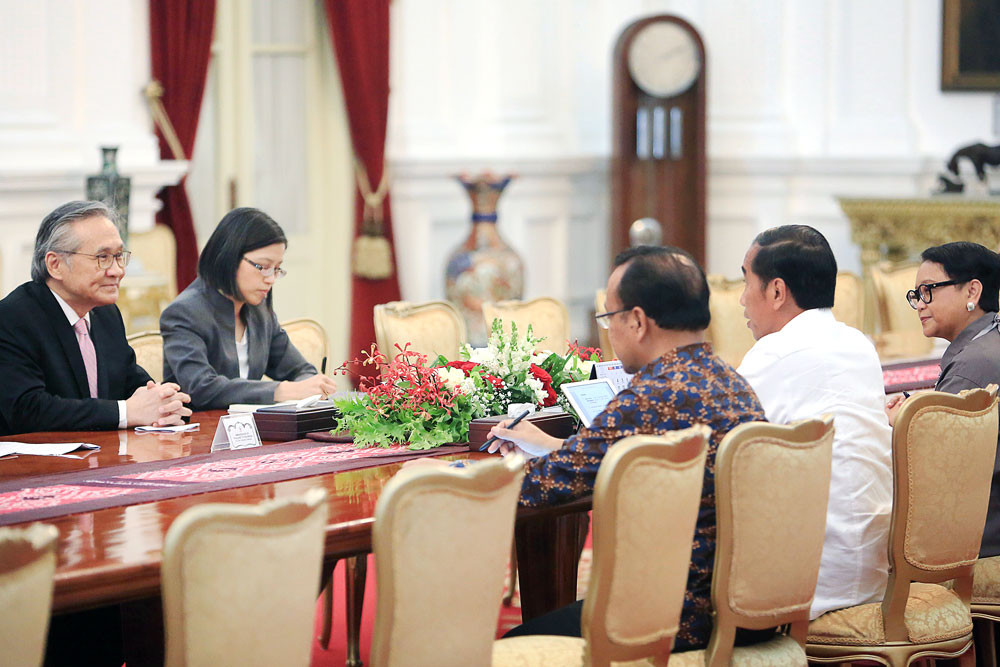Popular Reads
Top Results
Can't find what you're looking for?
View all search resultsPopular Reads
Top Results
Can't find what you're looking for?
View all search resultsThai generals need to learn from Indonesian military
Change text size
Gift Premium Articles
to Anyone
O
n March 24, Thai voters will go to the polls to elect their members of parliament, who will then elect a prime minister. On April 17, Indonesians will also exercise their constitutional right to directly elect their president and vice president, as well as members of the House of Representatives, the Regional Representatives Council and various local councils.
Philippine voters flocked to polling stations on Wednesday to vote in the midterm election that capped the first half of President Rodrigo Duterte’s six-year term, which will end in June 2022. As the Philippine election will barely impact other members of ASEAN, let us just focus on Thailand and Indonesia.
Indonesian voters are much luckier than their Thai counterparts. After the dissolution of the pro-Thaksin Shinawatra party, the Thai Raksa Chart, it is almost certain that the pro-Prime Minister Prayut Chan-o-cha, Palang Pracharat Party, will easily win the election. Prayut, who led the military coup against a democratically elected government in 2014, looks certain to stay on in power. So, is it a real general election?
For three decades Indonesia lived under a military regime, which came to an end in 1998. Now Indonesia is the third-largest democracy in the world after India and the United States. The Indonesian Military (TNI) returned to barracks for the sake of restoring civilian supremacy.
There have been efforts to tempt the TNI to regain some of its past privileges, but we believe our military will stick to its commitment and the nation will not allow its personnel to betray their oath.
The Thai military hopefully will be willing to learn from Indonesia’s journey in embracing democracy. It will not be easy, but the Thai military has no choice but to adapt itself to global norms.
Thailand is a great nation, which has never endured the pain and bitterness of imperialism. King Bhumibol Adulyadej guided the nation to a high level of welfare during his 50-year reign until his death in October 2016. The much admired and beloved king played a crucial role in Thailand’s amazing progress.
There were frequent military coups during his tenure, but the people obediently followed their king and the survival of any junta totally depended on the king. The world might have different opinions about the Thai military’s power at that time, but the nation accepted the situation because they knew they would be very safe under the king’s protection.
After his death, Crown Prince Maha Vajiralongkorn Bodindradebayavarangkun took over as Thai king. Times have changed and the new king is facing different challenges.
Thailand has won admiration in the region especially because of its economic development. Its ability to reap huge revenues from agribusiness and tourism and to attract foreign investment for decades has amazed its neighbors.
Indonesia, for its part, has won the world’s plaudits for its democratization. On June 7, 1999, Indonesia sprang a surprise by demonstrating its democratic maturity in holding a free and fair, indeed peaceful and festive general election. The nation overwhelmingly proved the international media wrong in their perception of ordinary, uneducated Indonesians as being unready for democracy.
It took Indonesia little more than a year, from the day Soeharto stepped down in May 1998, to organize a world-standard election. In 1999, the democratically elected People’s Consultative Assembly (MPR) elected the president and vice president.
In the following five years Indonesian democracy further advanced. In 2004, for the first time since independence in 1945, Indonesia directly elected its president and vice president. Our electoral system is simpler than that of the US and more democratic than that in many developed countries, including Australia.
To be fair, we must salute the TNI for giving up its civilian role and submitting to civilian supremacy after the 1999 election. The military was still represented in the House and the MPR in 1999-2004, but so small in number that it could not play a significant role, unlike during the New Order.
Many — especially those who did not experience Soeharto’s military regime — could understand the arrest of university lecturer and human rights activist, Robertus Robert, early this month. He has been charged with insulting the TNI because he sang the song which anti-Soeharto demonstrators chanted in 1998 to mock the abusive behavior of soldiers.
Speaking to the regular participants of the Kamisan (every Thursday) rally — parents or relatives of victims of past military violence — outside the Presidential Palace, Robertus lambasted Coordinating Maritime Affairs Minister Gen. (ret) Luhut Pandjaitan’s statement on the government’s plan to give civilian posts to active members of the TNI.
Critics have criticized the plan as a gateway to a revival of the military’s power, although President Joko “Jokowi” Widodo has said he backs the move to address an oversupply of colonels and generals. The government has pooh-poohed fears about the return of the military to power.
You may disapprove of Robertus’ actions, but his message was a timely alarm. He may soon face trial, but his warning has prompted the TNI to make it very clear that it has no intention of leaving its barracks and clawing its way back to the old dual function practice, where soldiers played both military and civilian roles.
Whether the civilian-military relations in Indonesia is appropriate for Thailand remains a question. But the Thai military can learn something from the experience of its Indonesian counterpart.











